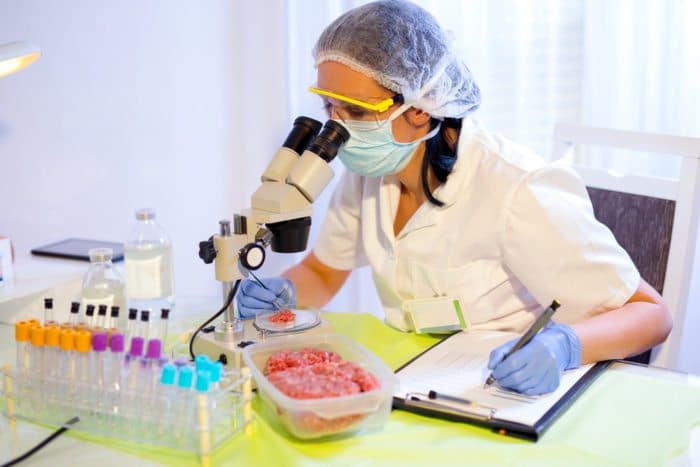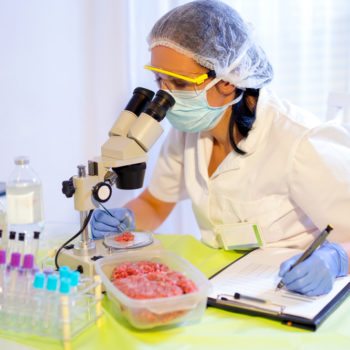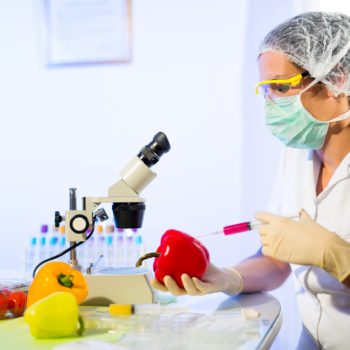Why We Love It
-
$72,030Potential Avg. Salary*
-
Growing DemandJob Outlook
* Salary & growth data is based on the recent Bureau of Labor and Statistics data published at https://www.bls.gov/oes/current/oes191012.htm for 19-1012 Food scientists and technologists 11/2021. Based on national data, not school-specific information. Conditions in your area may vary.
Are you interested in finding solutions to world hunger, creating cheaper and healthier foods, enabling farmers to increase crop production, or engineering crops that don’t need to be sprayed with pesticides?
If so, you may want to consider pursuing a bachelor of science in food science. Food science is a research-based discipline that covers food engineering, processing, chemistry, and nutrition.
What is a Degree in Food Science?
Some people who are interested in food become chefs, some become nutritionists, and some become farmers. Spanning all of those careers are the people interested in the science of food, and this is what you’ll focus on as a food science major.
Food scientists are interested in the journey of food from beginning to end—working to develop more productive or insect-resistant seeds, testing processed foods for quality and nutrition, and helping people with dietary restrictions form healthy meal plans.
Food science majors take coursework in culinary science, dietetics, community health, and agriculture as well as plant biology, ecology, geography, and plant taxonomy. While some students continue to earn graduate degrees after graduation to work in research and development, others find work in the field immediately after earning their bachelor’s degrees.
Some find careers in product development or quality assurance for food manufacturers, some go into agriculture and farming, and some work in food marketing and sales.
Recommended Schools
What Courses Would I Take For a Major in Food Science?
- Soil Information Systems
- Agricultural Economics
- Plant Taxonomy
- Environmental Law
- Physical Geology
- Food Engineering
- Food Processing
- Food Quality Assurance
What Jobs Can You Get with a Degree in Food Science?
In recent years, many American families have begun to become more and more concerned about how nutrition affects one’s overall health. This has led to a massive increase in popularity for organically grown foods, fewer preservatives, farmer’s markets, and community-supported agriculture.
These changes are impacting food manufacturing companies and farmers alike who will need the assistance of food scientists in the future in order to develop products that are both healthy and profitable.
How Long does it take?
A bachelors in Food Science will have a typical length of 4 years in a full time schedule. That said, there are many ways to speed up the timeframe by either taking more units via online coursework, community college, or taking free classes at OnlineDegree.com that could transfer to universities in the US.
Online Food Science Degree
The popularity of food science programs is increasing around the world with more universities offering this type of program. Online programs are also available however most of the students may be required to attend on-campus labs to gain practical experience.
Food science bachelor degree programs include around 120 credit hours that are usually completed within 4 years by full-time students. Students who already have an associate degree in food science can complete their degree in a shorter time.
What Can You Do With a Food Science Degree?
Food science is an interdisciplinary study that deals with topics related to the production, transportation, food processing and storage of food. It has gained increased attention with the massive growth in the population around the world which increased the demand for efficient production of food.
The revenue of the food industry in the US in 2018 was estimated to be around $2 trillion while the global market value was estimated to be around $3.4 trillion.
What does a food science student learn?
The role of food scientists is to enhance the productivity of crops and develop safer pesticides and herbicides. They also work on developing cheaper and safer methods for transportation or storage for prolonged time. Accordingly, they need to integrate the knowledge of chemistry, biology, materials science, mechanics and other fields.
The following list shows courses that are commonly taught in food science programs:
- Biochemistry and metabolism: This course introduces the metabolic processes happening in the cells that are directly related to food consumption.
- Farm to fork: the course introduces the logistics of food production including the transportation, storage and food processing steps.
- Introduction to food processing and engineering: this topic introduces the various processes done during the preparation of food including the effect of heat, additives or mechanical processing.
- Introduction to food microbiology: microbial contamination of food is a major concern for the food industry as it may lead to series health effects or economic loss.
- Food product development: this is a business-related course that introduces the process of designing a food product, determining the need and the overall cost.
- Research methods for food and nutritional sciences
- Food quality and safety assurance: the standard procedures for monitoring the safety and quality of food which is different from other industries because of the size of the industry and its effects on health.
- Diet and disease: the course investigates the relationship between various foods and human diseases such as diabetes, hypercholesterolemia and hypertension.
Now I have the food science degree…where can I work after graduating?
The food industry is a huge field and the demand for food scientists is very high in a large variety of available jobs. You should consider the following career options if you complete your degree in food science. Additionally, you may choose to start your own business or come up with other career options:
- Food scientists: their role is to work in the research and development related to food. They work to fight diseases affecting crops, develop new products using new or existing ingredients or develop crops that can withstand drought or water salinity. They may also work on the development of preservatives, flavors, food colors or other additives.
- Nutritional therapist: if you have good communication skills, you may use your knowledge of food to help people choose their appropriate healthy diet.
- Toxicologist: food scientists have excellent knowledge about toxins that may contaminate food, water or soil and how they affect human health.
- Marketing manager: marketing food products is challenging as the products are changing rapidly and the resources may get disturbed easily. Your knowledge in food science will help develop an efficient marketing strategy and marketing campaigns.
- Procurement manager: your role is to ensure that supplies are stable and that they are stored for an appropriate time before being processed or delivered. You should also confirm the quality of the purchased products.
Should I choose a food science degree?
Are you interested in food processing and storage? Do you enjoy cooking or eating new foods? When you travel to new countries, are you interested in testing their foods? If your answer to these questions is yes, then you should probably consider studying food science. Your study will help you develop a group of useful skills:
- Communication skills: food scientists need good communication skills to express their observations or conclusions. They also need to present their developed products.
- Critical thinking: it is needed to address scientific questions or problems related to the industry.
- Decision making: food scientists need to make critical decisions that may have significant economic impact or affect the health of thousands of people. Accordingly, their decisions should follow organized and solid thinking.
- Planning consumer education campaigns
- Staying updated regarding policies and regulations related to the food industry. Changes in regulations may have a significant effect on some products.
- Food scientists should be sensitive to environmental, sanitary and social issues.
Recommended Schools
Best Jobs for Food Science Degrees
Food scientists can work in a number of careers across a variety of industries. Many go to graduate school and earn advanced degrees to move into research, development, and food engineering roles.
But a graduate degree isn’t necessary to find work in this field. Individuals with bachelor’s degrees alone may find work in agriculture, food sales and marketing, food preparation, or quality assurance testing.
How to save time and money
Our mission is to help you to avoid paying full price for college. We want your Food Science degree to be affordable and accessible. Here’s how you could save:
Create Your Free SmartPlan

There are many ways to make college affordable and accessible.
That’s why we created a helpful tool called SmartPlan.
It’s free, and helps you find potential ways to save and tons of information about each school you’re considering
Think of it as your “college blueprint”, to help you instantly craft a path to your degree:
- Which Colleges Match Your Needs
- Ways You Could Save Time & Money
- Free Courses You Could Take for Credit
- Valuable Data and Insights on Each College
- Detailed Steps You Should Take!
See what’s possible for you and generate a free plan within just a few minutes
Create My SmartPlanYou Might also be Interested in
Many visitors who look for a degree in Food Science are also interested in the following degrees.










